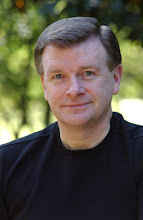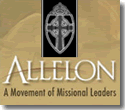Introduction by:
Milfred MinatreaLet me introduce you to my friend, Curt Ferrell. Curt and I met in Tampa, Florida a couple of years ago where he led worship and I was a guest speaker. Since that time, my love for Curt has grown as has my appreciation of his giftedness. Curt is Associate Pastor of Music and Worship at South Memorial Drive Church of God in New Castle, Indiana. He shares with us in this “postcard” the journey on which their church is embarking in a missional initiative. Married with two school-aged daughters, Curt is a writer, songwriter, worship leader, and dreamer. His interests vary from politics and genealogy, to black-and-white movies and culinary experimentation (which usually produces a messy kitchen but tasty treats).
 Humble yourselves, therefore, under God's mighty hand, that He may lift you up in due time.
Humble yourselves, therefore, under God's mighty hand, that He may lift you up in due time. 1 Peter 5:6. That's one of my "life verses". I believe, and have experienced the truth, that the most significant events in my life have been orchestrated by God. He has lifted me to specific places, and at specific times, for His glory and His purposes. The Journey in New Castle began just that way.
In October of 2007 I received a last-minute invitation to lead worship at a conference in Tampa, Florida. I'm always willing to lead worship and my schedule was flexible enough at the church, that I was able to go. My wife Cheryl and I, enjoy ministering in New Castle, Indiana at a church that loves the Lord and loves its pastors. Our church is a wonderful place to minister and the other staff members I've worked with are top-notch. We have become good friends. In fact, the opportunity in New Castle has seemed too good to be true. For the first year with our congregation, we kept waiting for the "other shoe" to drop . . . it never did. While there have certainly been times of stress and frustration, our time in New Castle has been mostly pleasant. But this trip to Tampa was soon to become a trailhead to a hike ordained by God into a new place . . . not geographically, but spiritually.
One of the speakers for the conference in Tampa was Milfred Minatrea. I had not heard of Milfred, but trusted friends and leaders at the conference told me that a book that he wrote changed their lives and ministries. Now, my favorite authors are C.S. Lewis and Dietrich Bonheoffer, so I greeted these words of recommendation for a book called
Shaped by God's Heart: The Passion and Practices of Missional Churches with skepticism. After I met Milfred, heard him speak, and saw his passion, my doubts began to fade.
I recommended the book to Pastor Chris and Pastor Tami when I got back to New Castle. As we read the book together it became clear that God was calling us to a new place. The church was doing good things, but were we doing God's things? We soon discovered that, mid-2008, Milfred was going to be at our national convention 35 miles away to lead a conference. Maybe Milfred would speak at our church that Sunday and introduce the concepts in
Shaped by God’s Heart to our congregation. God orchestrated that weekend, and the congregation found the trailhead.
During the next few months the pastoral staff and the leadership groups at the church felt that God was calling us "further up and farther in". At a planning session in November, we took the next step; starting in fall 2009 we would scrap our normal Sunday evening and Wednesday evening church events and, for 14 weeks, we would study the truths laid out in
Shaped by God’s Heart. On Sunday mornings, Pastor Chris would preach a message birthed from the concepts presented in one of the chapters. On Sunday and Wednesday evenings we would gather in book study groups to discuss the message of the week and the chapter it came from. Month by month anticipation, curiosity, and a little bit of fear built until August 23rd, 2009 and we started the journey as a congregation.
Where will the trail lead? Only God knows. Will we all get there together? I hope so. Will there be stragglers and those who surge ahead? Certainly. Will we have to change? Can anyone follow the lead of God and not be changed?
Three weeks into this new leg of the journey there is still a mixture of thoughts and feelings. Fear? Yes. The pastoral staff has put "all chips in", to use a poker phrase, and the congregation is looking head-on into certain change. Excitement? Yes. What adventures lay ahead for a people fully dedicated to be on mission for the Kingdom? Passion? That's beginning to grow . . .
It's funny how a last-minute invitation to lead worship can lead to a whole new journey with God. I continue to be amazed at how He orchestrates our lives.




























